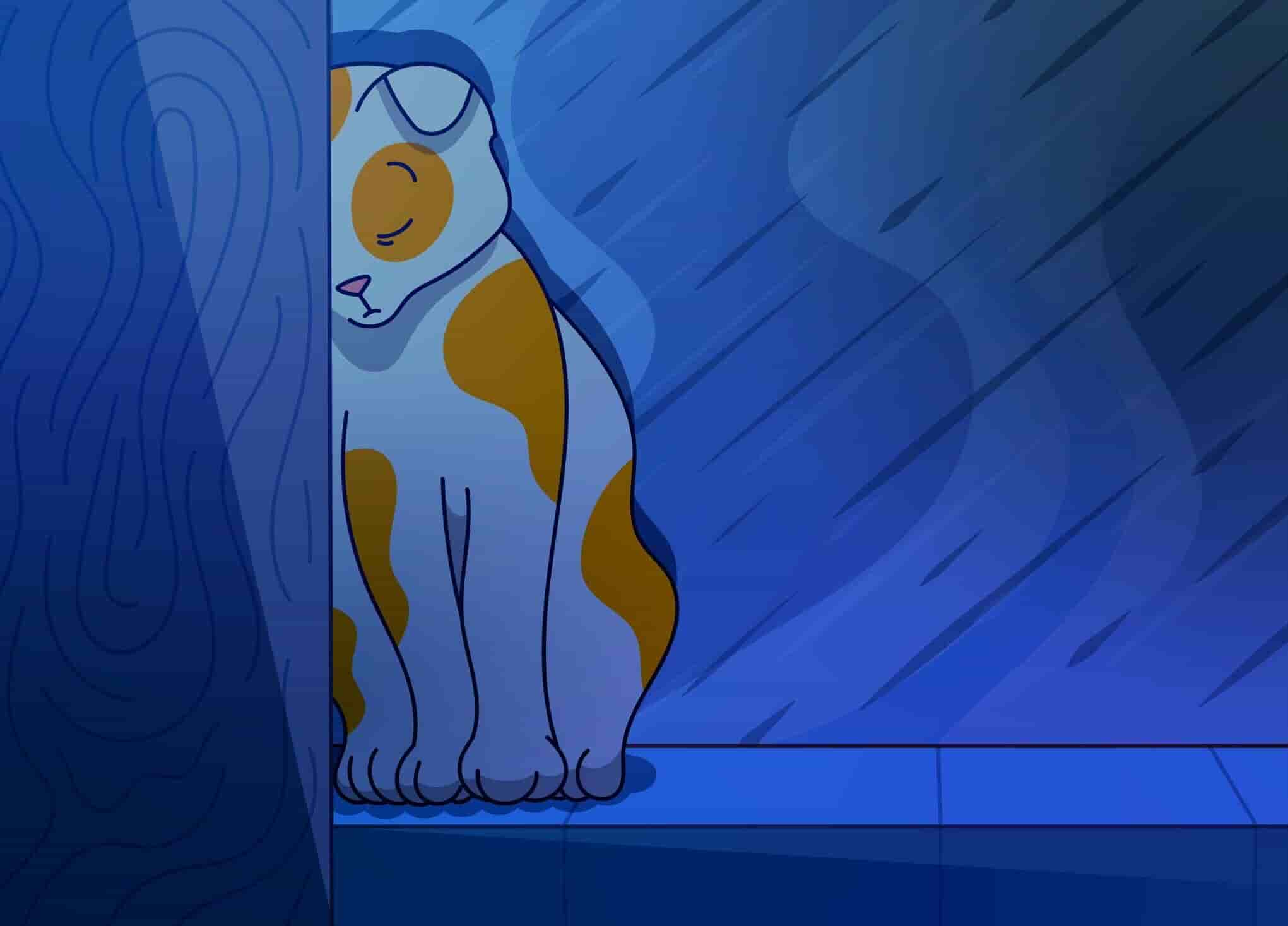Is your cat acting out of character?
If “Yes”, you may have a sad cat!
Fact: Depression in cats is a real and recognized condition.
The problem is cat depression can be tricky to spot. This 101 guide helps you spot low mood in cats, understand the causes, and then support your fur-friend.
An Absence of Joy
Behavioral experts explain cat depression as “an absence of joy”.
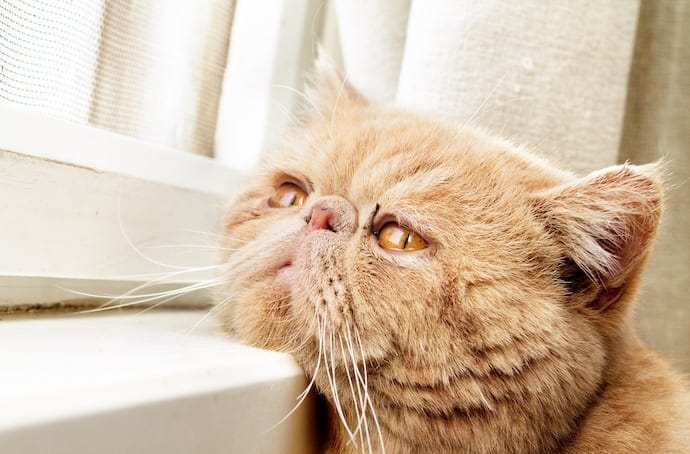
A sad cat alters their normal behavior. So if your cat no longer strolls over to greet you or stops grooming, this might be a sign that something is wrong.
Your first stop should be the vet. Always rule out medical causes before assuming a problem is psychological. Many common conditions cause a lack of energy, so always check out their health first.
If your cat gets the all clear on a health check, you may well have a depressed cat.
Ask Yourself: “Is My Cat Depressed?”
Have a think about your cat’s circumstances and the chances of them developing depression.
One of the many things we love about cats is their independent spirit. Cats choose who they love and receiving their affection is a great honor. This is an example of how cats like to be in control.
Cat behaviorists explain that depression occurs when a pet experiences events beyond their control. This might be moving home, the loss of a companion, or an owner returning to work.
Any stressful event that affects the cat can trigger the blues, including:
- Arrival of a new pet
- Loss of an owner
- Stray cats in the yard
- Family disruption, such as divorce
- New baby
- Owner going on vacation
- Building work in the home
Any stress may trigger depression, which also includes a cat not being able to do ‘catty’ things. A cat unable to climb, hunt, play, or claw can become frustrated and depressed.
Do a quick risk assessment on your cat. Has their life changed recently in an unsettling way?
Signs of Depression in Cats
The one word that best sums up the signs of cat depression is “withdrawal”.
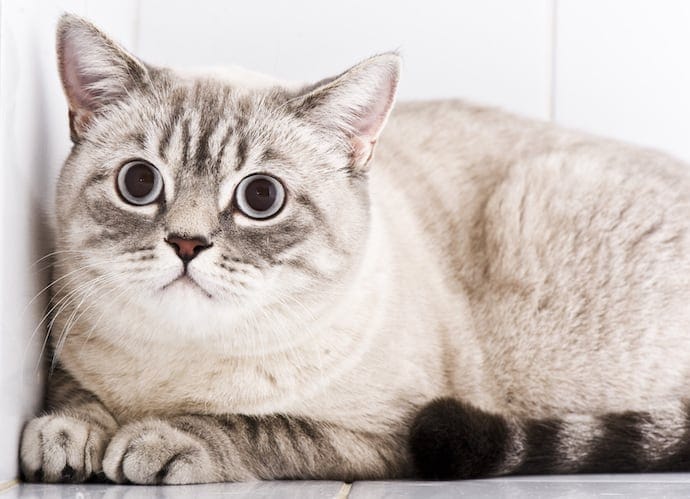
A depressed cat withdraws and ceases doing things they used to enjoy. Thus, if your feline stops doing something that usually makes them purr, you may have a sad cat on your hands.
Be alert for signs such as:
- Loss of appetite and disinterest in treats
- Sleeping when they would usually be awake
- Lack of grooming. You may notice this as a dull, dry, or knotted coat
- Withdrawal from tactile exchanges such as head bumping or lap cuddles
- Intermittent tummy upsets
- Altered habits such as not coming to greet you
- Loss of interest in favorite toys
- Weight loss or gain (depending on whether they comfort eat or not)
These signs are general; hence check that your cat is not ill before assuming they’re depressed. And the best-suited way to start an investigation is by asking Online Vet whether your cat is acting normal or you'd better take them for a checkup in a vet clinic.
Depression in Cats: Treatment
Yes, you can help a sad cat! Setting a routine, entertaining the cat, and medication can lift a depressed cat's mood.
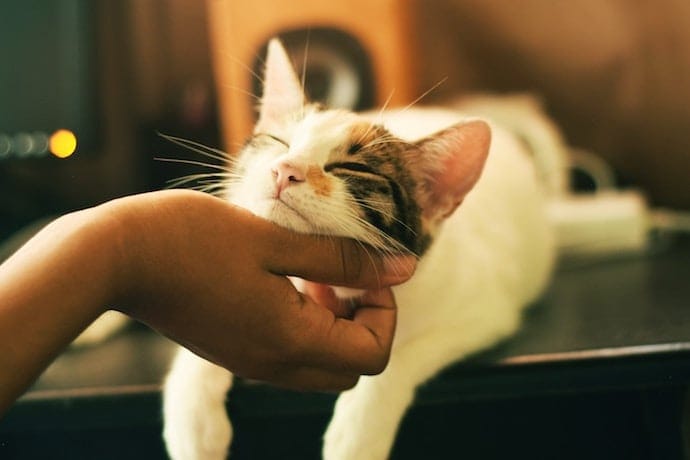
A Sense of Routine
Cats don’t like uncertainty. If their world has recently turned upside down, then restoring their routine can help a lot.
Imagine a cat that has lost a life-long companion. There’s a gaping hole in their life: Who do they snuggle up to now? Who washes their ears? Your cat may be feeling a huge gulf of anxiety that something so familiar is gone.
Those cats know that their new owner is distressed, that meals don’t arrive on time and that no one brushes their coat. What’s the cat to think? It’s likely they’re unhappy at their lack of control and that the markers in the day have gone.
When an owner feeds them on time, brushes them as usual, and gives gentle attention, this reassures the cat.
Make an effort to adhere to the schedule. Spend one-to-one time fussing and stroking the cat. Consider clicker training to reward purrs or times when your cat does break out of their funk.
Mental Stimulation
There’s nothing like boredom for anyone (human or feline) to over-think things and sink into a sad mood.
Avoid boredom.
Occupy your cat’s mind with plenty of mental stimulation. This has the bonus of the cat expressing normal behaviors such as hunting or pouncing. This eases frustration, one of the contributing factors for depression in cats.
Of course, cats don’t do crossword puzzles or Sudoku (they can’t hold the pen!) so how do you engage their mind?
- Play: Spend 5-10 minutes several times a day, engaging your cat in a game. Toys like a wing-on-a-string trigger get the cat swiping and swatting. Don’t expect too much at first. Be satisfied with a lazy flick of the paw and build on that.
- Mimic Hunting Activity: Hide a few ultra-tasty treats around the room. Show your cat where the first one is, and praise them when they eat it. Lure them to the next treat, and praise them again. They’ll sniff out the other treats and mimic their natural hunting activity, which is great for good mental health.
- Puzzle Feeders: Use an empty egg-carton as a simple puzzle feeder. Sprinkle a few bits of kibble into each empty cup. Your cat then has to move around to seek the next mouthful. Then look for interactive puzzle feeders where your cat has to bat the toy with their paw to get kibble to fall out.
- High Perches: Cats love to be up high. Provide a high perch by a window so they can climb up and watch the world outside.
- Cat Scratch Posts: Provide sturdy cat scratch posts by their bed and the door. Spritz the post with Feliway to encourage them to use it. Scratching is a natural territory marking behavior and helps your cat feel more secure.
- Obedience Training: Yes, you can train cats! (Although that’s a whole topic unto itself.) Training is wonderful one-to-one time that bonds you. It’s also mentally demanding for your cat and so it can help to fight depression.
Anti-Depressant Medication
If your sad cat is refusing to eat or interact, then medication may be needed in the short term. Speak to your vet about what’s the most appropriate med for your pet. You can have a consultation online using Vet Chat. With this service, you will get a qualified consultation in just a few clicks of your smartphone.
As well as prescription drugs, you can try:
- Feliway: This is a synthetic cat pheromone that gives your cat reassuring scent messages.
- Zylkene: This is a food supplement, derived from milk protein, which acts on the same parts of the brain as Valium. It has a natural anti-anxiety effect.
Cat Depression Prevention
If you are in a sad situation where you are about to lose one of a pair of cats, try to plan for the final parting. It’s thought cats understand death but not absence. Thus, if a bonded companion disappears, the remaining cat may feel bereft.
Give the surviving cat a chance to say goodbye. Let them sniff the body of the recently passed-companion, so they can process the death and accept it. It may not stop the cat from becoming depressed, but it may reduce the depth and severity of the sadness.
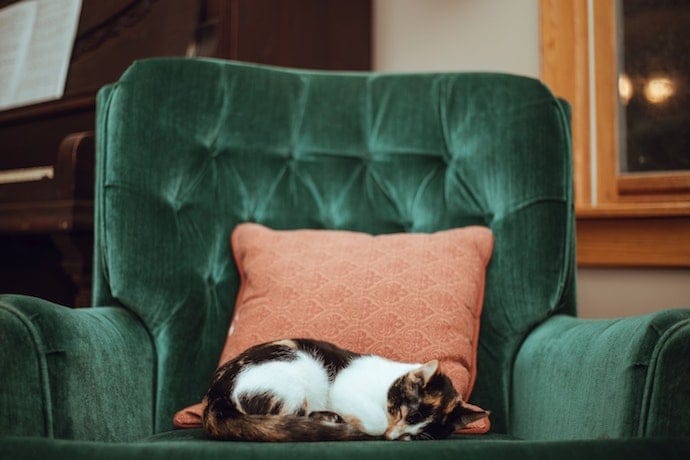
Likewise, for other changes in circumstances, try to shield your cat. Keep meals on time and spend time playing and fussing with them no matter what the changes are.
If you know something stressful is about to happen, use a Feliway diffuser. This helps to reduce anxiety and help your cat to cope better.
And importantly, avoid boredom. Make sure your cat has plenty of outlets for natural behaviors and play. Provide tall cat condos for your kitty to climb. Position a platform near a window so they can watch the birds. Leave cat toys out while you’re at work. A cardboard box with scrunched up paper inside makes an irresistible toy, so you don’t have to spend big.
Do Cats Know when You are Sad?
It’s official! Cats do recognize human moods.
Cats can pick up on human emotions, such as sadness. They just have limited ways of showing empathy.
So if you’re feeling sad and the cat sits on your lap; it might be their way of offering comfort.
Depression in Cats is a Real Thing
Recognize your cat’s normal play behavior and look for changes. If you’re out at work, this can be tricky, but not with Petcube.
Petcube is a window into your cat’s activities. Check what they’re up to, whether that’s play (great fun!) or excessive sleeping (a sign of a depressed cat). Petcube allows you to reassure your pet remotely and watch their reaction. And, best of all, play laser games with your cat to lift their mood.
Was this article helpful?
Help us make our articles even better

